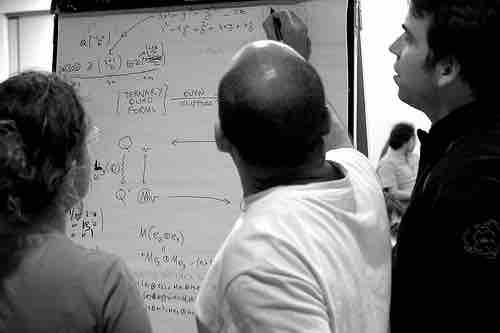Responsibilities in Group Work
When participating in group work, every member of the team has a responsibility to the group and the project. If each member does not participate, contribute, and deliver results, the group will ultimately fail to achieve their goal. Collaboration becomes effective only when group member participation is balanced .

Group Work
Assigning roles can make groups more effective.
Everyone in a group must learn to hold themselves accountable and be accountable to the other people in their group. Without accountability, work will not get done, deadlines will not be met, and the group will not be able to reach its goal. Individual and group accountability means that no one student has to do all the work. Accountability means not only being accountable for the physical work that a group member must deliver, but also attendance to group meetings, conduct, and behavior towards other group members, etc. It is also important to remember that group members are diverse and each one has a different strength and perspective to bring to the project based on their backgrounds, learning style, experiences, and aspirations.
Typical Roles in a Group
While everyone should be responsible for brain storming, problem solving, and providing their experience and knowledge, sometimes it can be helpful to assign group member specific roles. That way, members know exactly what they are responsible for. Four roles that are commonly found in groups are: a leader, a scribe, a lessons learned tracker, and a devil's advocate.
- Leader – In the event there is no clear chain of command, a team must be prepared to assign the role of leader. A leader can keep the team focused, mediate conflicts, and ensure that individuals are held accountable.
- Note taker or scribe – again, a simple idea, but documenting every meeting is an important step in developing a productive team. A scribe can quickly get a team up to date with past notes so little time is wasted remembering where you left off. Documenting and distributing notes from each meeting will equally inform all team members.
- Lessons Learned tracker – Identify one person to track both positive and negative outcomes of meetings and projects. This individual can solicit input from other members. By documenting what everyone thinks went well and why and what did not go well and why, can keep a team productive by not repeating past mistakes.
- Devil's Advocate – Teams need to embrace conflict and different points of view. By assigning a devil's advocate, this person can freely bring up alternatives or objections, making the team more objective.
By assigning these roles to members of the group, it can increase efficiency and productivity. The group now has people in specific roles to help them stay on track and the group members can now clearly outline their responsibilities in regards to the group work.
Characteristics of Great Group Members
Characteristics of great group members are those who actively participate, respect all other members, can both learn from other members and teach them, values other's contributions, draws on their own unique past experience and knowledge, and feels a sense of ownership over the project. To strive to embody all of these characteristics is the responsibility of all group members, regardless of their assigned role.
Responsibilities of Group Members
Group members are not only responsible for creating positive productivity within their group, but they must also avoid falling into the trap of unproductive behaviors that also arise in group settings. Group think and social loafing are two incredibly common negative phenomena that arise in group collaboration.
- Groupthink is simply going along with the team on a decision because that seems to be the consensus and they want to avoid conflict. Having a strong devil's advocate will help reduce the chances of groupthink.
- Social loafing is someone that is putting forth less effort as a member of a group than they would as an individual. They are allowing the other members of the group to do the majority of the work with the intention of still reaping equal benefits. Again, leadership and holding people accountable is a great tool to deal with social loafing.
Working in groups can be challenging. Blending people from many different backgrounds, with different personalities styles and work ethics can make consensus difficult. However, when all group members take on their expected responsibilities, group work can become much more enjoyable and effective.